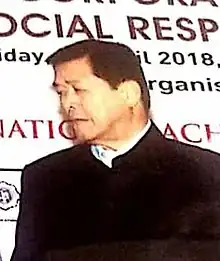Korn Dabbaransi | |
|---|---|
กร ทัพพะรังสี | |
 Korn in 2018 | |
| Deputy Prime Minister of Thailand | |
| In office 5 March 2002 – 8 November 2003 | |
| Prime Minister | Thaksin Shinawatra |
| In office 5 October 1998 – 9 November 2000 | |
| Prime Minister | Chuan Leekpai |
| In office 25 November 1996 – 9 November 1997 | |
| Prime Minister | Chavalit Yongchaiyudh |
| Minister of Science and Technology | |
| In office 10 March 2004 – 1 August 2005 | |
| Prime Minister | Thaksin Shinawatra |
| Preceded by | Chettha Thannajaro |
| Succeeded by | Prawit Rattanapian |
| Minister of Public Health | |
| In office 5 October 1998 – 9 November 2000 | |
| Prime Minister | Chuan Leekpai |
| Preceded by | Rakkiat Sukthana |
| Succeeded by | Sudarat Keyuraphan |
| Minister of Industry | |
| In office 25 November 1996 – 9 November 1997 | |
| Prime Minister | Chavalit Yongchaiyudh |
| Preceded by | Kosit Panpiemras |
| Succeeded by | Somsak Thepsuthin |
| Minister to the Office of the Prime Minister | |
| In office 9 August 1988 – 9 December 1990 | |
| Prime Minister | Banharn Silpa-archa |
| Personal details | |
| Born | 14 September 1945 Bangkok, Thailand |
| Political party |
|
| Spouse | Raphiphan Dabbaransi |
| Alma mater | University of Massachusetts |
Korn Dabbaransi (Thai: กร ทัพพะรังสี, RTGS: Kon Thappharangsi, alternatively transcribed as Thapparangsi or Dabaransi, Thai pronunciation: [kɔːn tʰáppʰáraŋsǐː]; born 14 September 1945) is a Thai politician. He was the leader of the National Development Party from 1998 to 2003. Korn served as deputy prime minister and as a cabinet minister in several governments. He currently serves as the President of the Thai-Chinese Friendship Association.
Family and education
Korn Dapparansi is a fourth generation Thai Chinese. He is a grandson of former deputy prime minister Phin Choonhavan and a nephew of former prime minister Chatichai Choonhavan.[1][2] He graduated from Saint Gabriel's College and the University of Massachusetts.[3]
Political career
He entered politics in 1974, representing the Thai Nation Party of his uncles Chatichai and Pramarn Adireksarn. Korn served as Deputy Minister of Industry in the government of General Prem Tinsulanonda from 1986 to 1988.[4] He was a minister to the Office of Prime Minister in his uncle Chatichai's cabinet from 1990 to 1991.[5] After the military coup d'état of 1991, he was again Minister to the Office of Prime Minister in the short-lived military-backed government of Suchinda Kraprayoon.[6] After the events of the Black May 1992, that toppled the Suchinda administration, he left the Thai Nation Party and founded the National Development Party, together with Chatichai.[7]
In December 1994, Korn was again appointed Minister to the Office of Prime Minister by Prime Minister Chuan Leekpai, he held that position until the government lost its majority in 1995.[8] In Chavalit Yongchaiyudh's coalition government, Korn held the position of Deputy Prime Minister and Minister of Industry from 1996 to 1997.[9] In 1998, Korn took over the chairmanship of the National Development Party from Chatichai. In October of that year, he was made Deputy Prime Minister again under Chuan Leekpai, holding the public health portfolio additionally.[10]
In the succeeding cabinet of Thaksin Shinawatra, Korn was again Deputy Prime Minister from March 2002 to November 2003, when Thaksin dropped the National Development Party from his coalition. Thereupon Korn defected to the Prime Minister's Thai Rak Thai Party.[11] He was called up to the cabinet as Minister of Science and Technology again in March 2004, serving until August 2005.[12][13]
In 2007, Korn left Thai Rak Thai for the Royalist People's Party (Pracharaj) of Sanoh Thienthong, became deputy leader, but resigned from the party in October of the same year, to re-join the Thai Nation Party after 15 years.[14]
Other offices
Korn was the president of the International Badminton Federation (IBF).[3] He has been the chairman of the Thai-Chinese Friendship Association since 2002.[15]
References
- ↑ Ueda, Yoko (2000), "The Entrepreneurs of Khorat", Money & power in provincial Thailand, NIAS Publishing, p. 182, ISBN 9788787062701
- ↑ Close bond with China inherited from ancestors
- 1 2 Co-Chairman: Korn Dabbaransi – Former Deputy Prime Minister of Thailand, Asia Pacific Exchange & Cooperation Foundation, retrieved on 22 March 2012
- ↑ Assembly XLIV Archived 2012-07-23 at the Wayback Machine, The Cabinet, retrieved 22 March 2012
- ↑ Assembly XLVI Archived 2011-06-05 at the Wayback Machine, The Cabinet, retrieved 22 March 2012
- ↑ Assembly XLVIII Archived 2011-06-05 at the Wayback Machine, The Cabinet, retrieved 22 March 2012
- ↑ Maisrikrod, Surin (1992), Thailands Two General Elections in 1992: Democracy Sustained, Institute of South East Asian Studies, p. 7, ISBN 9789813016521
- ↑ Assembly L Archived 2012-01-26 at the Wayback Machine, The Cabinet, retrieved 22 March 2012
- ↑ Assembly LII Archived 2011-06-05 at the Wayback Machine, The Cabinet, retrieved 22 March 2012
- ↑ Assembly LIII Archived 2011-08-21 at the Wayback Machine, The Cabinet, retrieved 22 March 2012
- ↑ Connors, Michael Kelly (2006), "Thaksin's Thailand: Thai Politics in 2003-04", Thailand's Economic Recovery, Institute of Southeast Asian Studies, p. 32, ISBN 9789812303523
- ↑ Assembly LIV Archived 2011-06-05 at the Wayback Machine, The Cabinet, retrieved 22 March 2012
- ↑ Assembly LV Archived 2011-06-05 at the Wayback Machine, The Cabinet, retrieved 22 March 2012
- ↑ Mr. Korn quits Pracharaj to join Chart Thai, NNT National News Bureau of Thailand, 31 October 2007, archived from the original on 15 July 2012, retrieved 22 March 2012
- ↑ Guangyong, Sun (22 June 2011), "Thai diplomat: CPC serves people", People's Daily Online, retrieved 22 March 2012